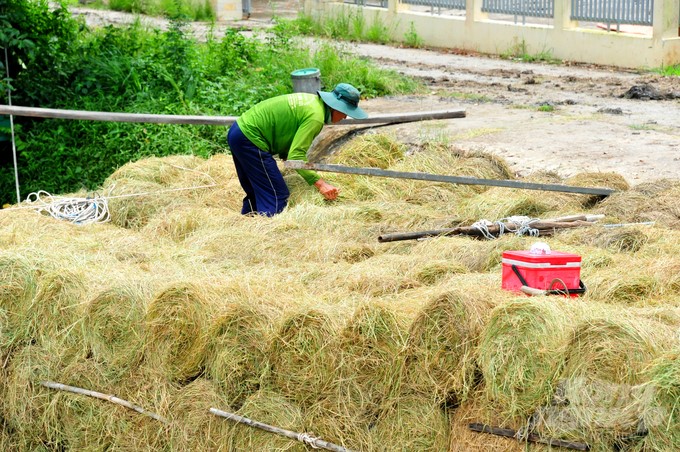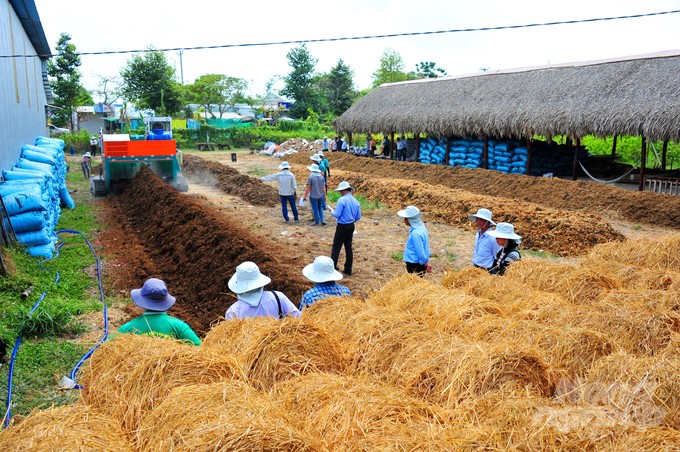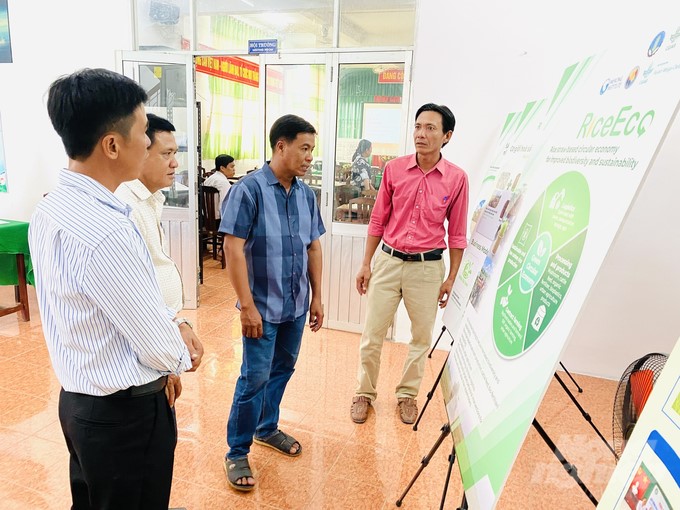May 17, 2025 | 04:37 GMT +7
May 17, 2025 | 04:37 GMT +7
Hotline: 0913.378.918
May 17, 2025 | 04:37 GMT +7
Hotline: 0913.378.918

Currently, the Mekong Delta produces roughly 30 million tons of rice straw/year, but it is estimated that only 30% of rice straw is collected for mushroom production, stump cover, and animal feed. Photo: Le Hoang Vu.
Recently, the Can Tho Sub-Department of Crop Production and Plant Protection, in collaboration with the International Rice Research Institute (IRRI), held a meeting of agents in the value chain of products from straw. The meeting aims to promote innovation in the rice straw value chain, strengthen linkages and cooperation, accelerate the application of sustainable management measures, and avoid burning straw in the fields. The orientations will contribute to the development of green agriculture and sustainable rural areas.
Ms. Dinh Thi Kim Dung, Chief of the IRRI Secretariat in Vietnam, said that the Mekong Delta currently produces about 25 million tons of rice/year and, at the same time, creates about 30 million tons of rice straw. However, it is estimated that only about 30% of rice straw is collected for mushroom production, stump cover, animal feed, etc., and 70% is burned in the fields. This causes a loss of nutrients and environmental pollution, and plowing and burying straw into flooded fields causes an increase in greenhouse gas emissions. The main cause of this real situation is partly due to the lack of technological solutions for the collection, treatment, and processing of rice straw and the low value rice straw brings.
Therefore, over the past time, IRRI has coordinated with Can Tho city’s agriculture sector and localities in the Mekong Delta to deploy many activities of training and supporting farmers in applying mechanization for straw collection and building models of developing livelihood and increasing income from straw, such as using straw to grow straw mushrooms, make plant pots, or produce organic fertilizers, etc.
In particular, through the project "Promoting innovation in the straw value chain in Vietnam", IRRI has also coordinated with relevant units to promote surveys, research, and support activities for farmers in developing value chains for products from straw.

Currently, some cooperatives in Can Tho City have produced organic fertilizer from straw with technology supported by IRRI to sell to the market. Photo: Le Hoang Vu.
Currently, IRRI is coordinating with agencies and units to deploy activities to support farmers in exploiting and promoting the value of rice straw and provide information on the situation of rice straw collection, production, and trading of products from rice straw in the Mekong Delta.
In addition, they also coordinate in introducing the results obtained from market research surveys and research on the value chain of products made from straw, which have been recently implemented by IRRI's research team. Since then, farmers and related parties have exchanged ideas, proposed innovations, and offered solutions to remove difficulties, promote linkages, and develop the value chain of products from straw according to market demand. Proposing new ideas and directions to collect, effectively exploit rice straw, and develop many high-value-added products, expanding the consumption market. In addition, IRRI also supports farmers to promote mechanization in straw collection and develop groups and teams for collection services.

Mekong Delta farmers learn about the process of applying mechanization to produce organic fertilizer from straw. Photo: Le Hoang Vu.
Ms. Pham Thi Minh Hieu, Director of the Can Tho Crop Production and Plant Protection Sub-Department, said that in several past rice crops, the unit has coordinated with IRRI to promote the development of value chains of products from straw or rice cultivation using organic fertilizers from straw, aiming to reduce the cost of using chemical fertilizers by 35–40% and increase profits by 10% on the same area compared to traditional production.
With practical models taking advantage of rice straw by-products, Can Tho city now has a few cooperatives that have produced organic fertilizer from rice straw with technology supported by IRRI to sell to the market. Thereby creating a new direction to produce value-added products from rice straw, helping to take advantage of the by-products in the rice cultivation process, and then changing farmers' practices of handling rice straw.
According to Ms. Hieu, instead of burying or burning straw in the fields after harvesting rice crops as before, farmers will now switch to using straw rolling machines to produce products from rice straw. Specifically, to make organic fertilizer from straw and biodegradable products from straw, increasing income for farmers and contributing to protecting the ecological environment.
Translated by Huyen Vu Thu

(VAN) Cold-barn systems efficiently manage environmental and temperature conditions, which aids in the prevention of respiratory diseases in pigs and protects them from the vectors that transmit African swine fevers.

(VAN) To tackle challenges, the project 'Addressing key technical bottlenecks in the grouper supply chain in Vietnam' has been underway since 2024.

(VAN) The project 'Disease-Resilient and Sustainable Cassava Production Systems in the Mekong Region', funded by the Australian Center for International Agricultural Research (ACIAR), is being implemented from 2024 to 2028.

(VAN) Data from 10,000 farming households will help professionalize production organization and support the implementation of the One Million Hectares Program for High-Quality, Low-Emission Rice Cultivation.

(VAN) FAO Director-General QU Dongyu marks International Day of Plant Health at NENA conference.

(VAN) Deputy Minister of Agriculture and Environment Hoang Trung affirmed that floriculture and ornamental plants are a growing industry that receives significant global attention.

(VAN) The three staple crops dominating modern diets – corn, rice and wheat – are familiar to Americans. However, fourth place is held by a dark horse: cassava.